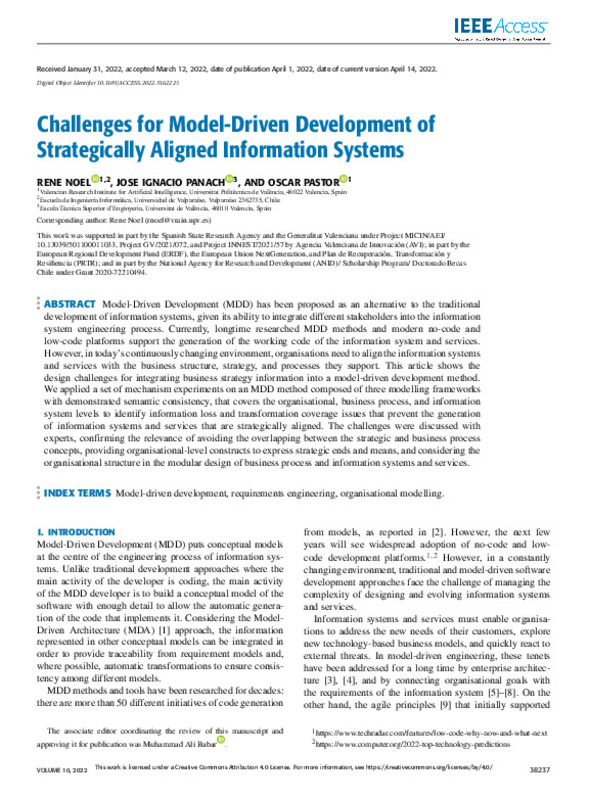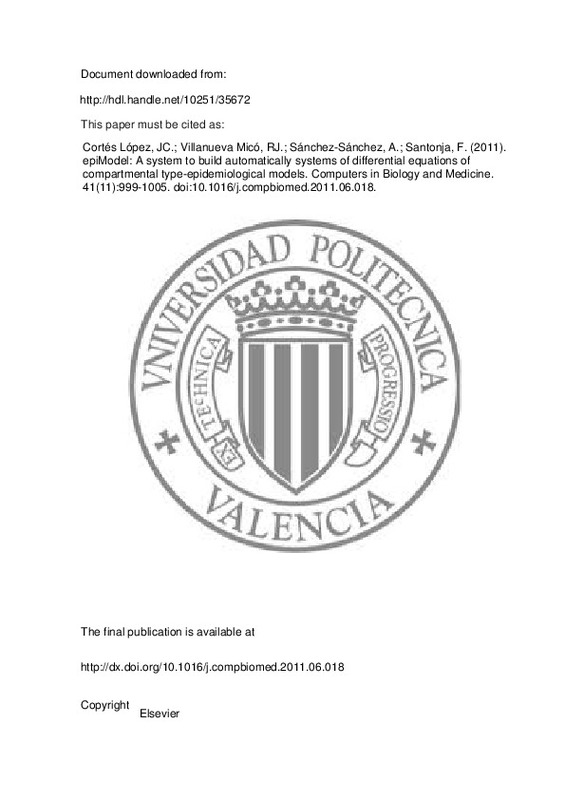Noel-Lopez, R.; Panach, JI.; Pastor López, O. (2022). Challenges for Model-Driven Development of Strategically Aligned Information Systems. IEEE Access. 10:38237-38253. https://doi.org/10.1109/ACCESS.2022.3162225
Por favor, use este identificador para citar o enlazar este ítem: http://hdl.handle.net/10251/194310
|
Título:
|
Challenges for Model-Driven Development of Strategically Aligned Information Systems
|
|
Autor:
|
Noel-Lopez, Rene
Panach, Jose Ignacio

 Pastor López, Oscar
Pastor López, Oscar
|
|
Entidad UPV:
|
Universitat Politècnica de València. Escola Tècnica Superior d'Enginyeria Informàtica
|
|
Fecha difusión:
|
|
|
Resumen:
|
[EN] Model-Driven Development (MDD) has been proposed as an alternative to the traditional development of information systems, given its ability to integrate different stakeholders into the information system engineering ...[+]
[EN] Model-Driven Development (MDD) has been proposed as an alternative to the traditional development of information systems, given its ability to integrate different stakeholders into the information system engineering process. Currently, longtime researched MDD methods and modern no-code and low-code platforms support the generation of the working code of the information system and services. However, in today's continuously changing environment, organisations need to align the information systems and services with the business structure, strategy, and processes they support. This article shows the design challenges for integrating business strategy information into a model-driven development method. We applied a set of mechanism experiments on an MDD method composed of three modelling frameworks with demonstrated semantic consistency, that covers the organisational, business process, and information system levels to identify information loss and transformation coverage issues that prevent the generation of information systems and services that are strategically aligned. The challenges were discussed with experts, confirming the relevance of avoiding the overlapping between the strategic and business process concepts, providing organisational-level constructs to express strategic ends and means, and considering the organisational structure in the modular design of business process and information systems and services.
[-]
|
|
Palabras clave:
|
Modeling
,
Business
,
Information systems
,
Object oriented modeling
,
Analytical models
,
Model-driven development
,
Codes
,
Requirements engineering
,
Organisational modelling
|
|
Derechos de uso:
|
Reconocimiento (by)
|
|
Fuente:
|
IEEE Access. (eissn:
2169-3536
)
|
|
DOI:
|
10.1109/ACCESS.2022.3162225
|
|
Editorial:
|
Institute of Electrical and Electronics Engineers
|
|
Versión del editor:
|
https://doi.org/10.1109/ACCESS.2022.3162225
|
|
Coste APC:
|
1150 €
|
|
Código del Proyecto:
|
info:eu-repo/grantAgreement/GVA//GV%2F2021%2F072/
info:eu-repo/grantAgreement/AVI//INNEST%2F2021%2F57/
info:eu-repo/grantAgreement/ANID//2020-72210494/
|
|
Agradecimientos:
|
This work was supported in part by the Spanish State Research Agency and the Generalitat Valenciana under Project MICIN/AEI/10.13039/501100011033, Project GV/2021/072, and Project INNEST/2021/57 by Agencia Valenciana de ...[+]
This work was supported in part by the Spanish State Research Agency and the Generalitat Valenciana under Project MICIN/AEI/10.13039/501100011033, Project GV/2021/072, and Project INNEST/2021/57 by Agencia Valenciana de Innovacion (AVI); in part by the European Regional Development Fund (ERDF), the European Union Next Generation, and Plan de Recuperacion, Transformacion y Resiliencia (PRTR); and in part by the National Agency for Research and Development (ANID)/Scholarship Program/Doctorado Becas Chile under Grant 2020-72210494.
[-]
|
|
Tipo:
|
Artículo
|











